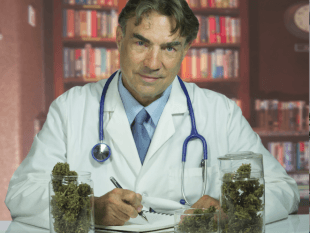Recent scientific studies regarding the use of cannabis (marijuana) and its healing powers are further disproving the government’s biased and inaccurate stance against its medical use. The government refers to marijuana as a “gateway” drug to harder substances and schedules it along side them even though it has proven to be safer than alcohol.
Taking these claims into consideration, scientists across the country have taken it upon themselves to research the chemical makeup of marijuana and prove to the public the benefits that it holds. Through the research of endocannabinoids, a stress-regulating chemical found in the brain that is also found in marijuana, scientists are producing evidence to prove that marijuana usage could benefit those who suffer from depression.
Chronic depression is one of the most common mental illnesses in America with about 6.7% (14 Billion) of the country’s population suffering from the disease. With depression being such a common disease in America, scientists from the University at Buffalo have conducted research which claims that endocannabinoids, a chemical makeup found in the brain, are similar to the chemical makeup of marijuana.
While Haj-Dahmane cautions that this research is still in its early stages, it is an idea to consider. If the cause of stress is a reduction in endocannabinoids, and marijuana usage increases endocannabinoids in the bodies of animals, does it not make sense that marijuana could potentially be used medicinally to reduce stress in humans as well?
Furthering the idea of using marijuana to combat depression, this article from Huffington Post piggybacks on the aforementioned University of Buffalo study looking further into the complex makings of diagnosed depression. Huffington Post posed a critical question in the closing of their article stating, “some research has suggested that regular and heavy marijuana smokers are at a higher risk for depression, although a causal link between cannabis use and depression has not been established.”
Depression is a very complex illness because the factors that cause it are so widespread and depend on instances that have happened in an individual’s life. While there are no confirmed cases of heavy marijuana usage causing or relieving depression, it is important to consider all aspects of the illness to better regulate and learn what dosages, frequencies, and strains of marijuana can better help those suffering from depression.
Using animals as test subjects, scientists Samir Haj-Dahmane, PhD and Roh-Yu Shen, PhD studied the effects that stress held on the animals. When introduced to a stressful environment, the animals’ level of endocannabinoids dropped significantly, leading the animals to feel stress. When introduced to marijuana, the levels of endocannabinoids increased and the animals began to show signs of relieved stress
Focusing on PTSD, another mental illness that affects many Americans, this article from Science Daily discusses the usage of marijuana in individuals suffering from PTSD and how their symptoms have declined over the time of their usage. The researchers from New Mexico (the first state to legalize medicinal marijuana use) used the “CAPS” method, which is essentially a method that is used with PTSD patients to ask questions about a traumatic experience that a patient experienced and measure their response on a 0-4 scale.
Researchers learned from this experiment that those patients who received medical marijuana showed a 75% reduction in all three areas of PTSD side effects. As stated with other research results, these studies are still in the developmental process and require more testing and circumstantial research to truly validate the correlation between medical marijuana usage and a decrease in depression among people.
With the thought of marijuana possibly becoming another medication to add to the list of antidepressants, it is important to think about the current, long list of antidepressants currently in the market to help “treat” patients. With marijuana being a natural substance and untampered by other chemicals, it makes for a neutral medication that can easily be combined with other prescriptions without the risk of overdose (because there are no recorded cases of marijuana overdose in the DEA database to date). Other antidepressants, however, cannot make these claims.
As discussed on Natural Blaze, antidepressants come with long, unattractive lists of side effects, and are extremely risky to mix with each other or other substances (such as alcohol). SSRI antidepressants, as discussed in the article, bring on unattractive side effects such as irritability and violent outbursts, but they are not alone. Other antidepressants can cause mood swings, weight loss or gain, schizophrenia, and other side effects, while marijuana causes none of these.
Research and development in marijuana studies is still a work in progress, though there are new scientific breakthroughs regarding benefits of medicinal marijuana use daily. With medical marijuana studies producing more positive outcomes than negatives, it is becoming more and more ignorant to be in disbelief that marijuana heals more people than it makes “couch potatoes.”
The use of “all natural” products is a rising trend in America, from foods to hygiene products, so why should we not entertain the idea of a natural medication and relieve ourselves of the worries of side effects caused by manmade chemical substances?








